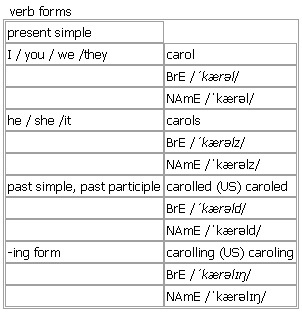 carol
carol

carol [carol carols carolled caroled carolling caroling] noun, verb BrE [ˈkærəl] NAmE [ˈkærəl]
noun (also ˌChristmas ˈcarol)
a Christian religious song sung at Christmas
•a carol service (= a church ceremony in which people sing ↑carols )
Word Origin:
Middle English: from Old French carole (noun), caroler (verb), of unknown origin.
Culture:
carols and carol singing
Carols are traditional songs that are sung just before ↑Christmas. Many of them celebrate the birth of Jesus Christ.
Carols were first sung in the 14th century. They were popular songs with a lively tune, and contained references to the celebrations and feeling of goodwill associated with Christmas, as well as to Christ’s birth. One of the oldest printed carols, dating from 1521, is the Boar’s Head Carol, which was sung in Queen’s College, ↑Oxford as Christmas lunch was carried in. Other traditional carols that are thought to have originated at this time include ↑God Rest You Merry, Gentlemen and ↑While Shepherds Watched Their Flocks by Night.
In England during the 16th century, the Puritans tried to stop people singing carols, but the words continued to be handed down from one generation to the next. In the 19th century many of these carols were collected and printed. Some tunes were taken from ↑folk songs, others were specially written. Many of the most popular carols heard today date from this time. They include ↑O Come, All Ye Faithful, ↑Hark! the Herald Angels Sing, ↑Good King Wenceslas, ↑Away in a Manger and ↑O Little Town of Bethlehem.
Traditional carols are very popular in Britain and America, but children also like more modern songs, such as ↑Rudolph, the Red-nosed Reindeer, about how a reindeer’s bright red nose lights the way for ↑Santa Claus to take toys to children during a storm, and Frosty the Snowman, which tells the story of a figure made of snow who comes to life.
In the 19th century groups of carol singers, called waits, used to gather in the streets to play and sing for local people, who thanked them by offering drinks or mince pies (= small round pies containing dried fruit, apples and sugar). This custom became known as wassailing and still continues in Britain, with people meeting to sing carols in most town and village centres. Any money that is collected is given to charity. Some singers walk from street to street, singing carols outside each house. In the US door-to-door carol singing is not common, except in a few small communities. Families sing carols when they decorate the Christmas tree.
Carols are also sung in churches and, in Britain, in schools, in special Christmas services. One of the most famous carol services is the ↑Festival of Nine Lessons and Carols, which is performed at ↑King's College, Cambridge, and broadcast on ↑BBC radio on Christmas Eve.
verb (-ll-, US -l-)intransitive, transitive ~ (sth) | + speech
to sing sth in a cheerful way
Verb forms: 
Word Origin:
Middle English: from Old French carole (noun), caroler (verb), of unknown origin.
Example Bank:
•‘So good of you to join us!’ he carolled merrily.
•They carolled loud and long.
See also: ↑Christmas carol
|
|
